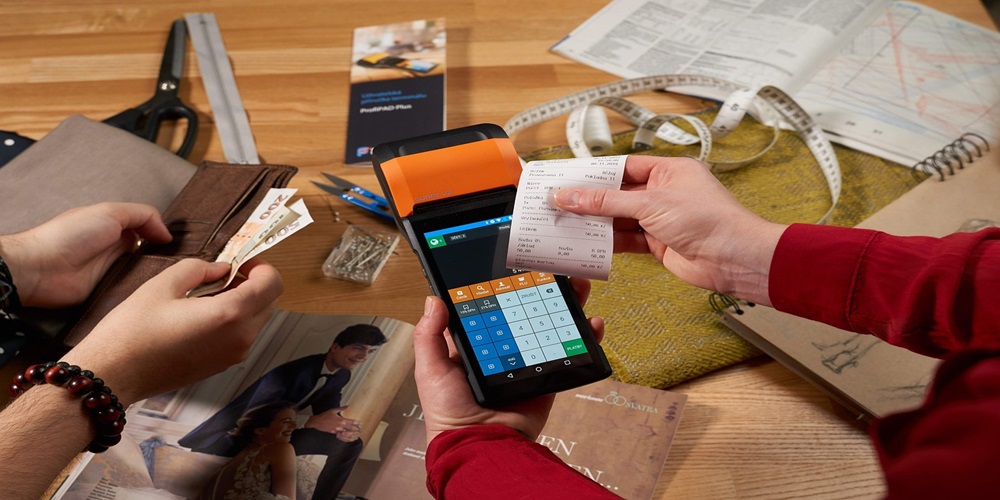In today’s fast-paced digital landscape, small businesses are navigating a thrilling transformation in the world of payments. Gone are the days when cash and cards were the only options at checkout. As technology leaps forward, new payment solutions are emerging that not only streamline transactions but also offer security, efficiency, and convenience like never before. From mobile wallets to cryptocurrency integration and AI-driven analytics, these cutting-edge innovations aren’t just reshaping how we pay—they’re empowering small businesses to thrive in an increasingly competitive market. Join us as we explore the future of payments and discover how these groundbreaking technologies can give your business an edge over the competition!
Introduction to the Current Payment Landscape for Small Businesses
The payment landscape is changing faster than ever, and small businesses are right in the thick of it. Gone are the days when cash was king. Now, digital transactions reign supreme, offering speed and convenience like never before. Whether you’re a local coffee shop or an online boutique, having efficient payment solutions can make all the difference for your bottom line.
Today’s consumers expect seamless experiences—quick checkouts and multiple payment options at their fingertips. This shift has opened doors to innovations that not only streamline processes but also enhance security and customer satisfaction. As technology evolves, so do the possibilities for small businesses looking to stay competitive in a dynamic market.
Curious about what these innovations mean for you? Let’s dive into how cutting-edge technologies are reshaping payments for small businesses everywhere.
The Rise of Fintech: What it Means for Small Business Payments
Fintech is reshaping the payment landscape for small businesses. Traditional banking methods often come with high fees and complex processes, but fintech offers a breath of fresh air.
Startups in this sector are leveraging technology to create user-friendly solutions tailored specifically for smaller enterprises. These innovations make transactions faster, easier, and more affordable.
Small business owners now have access to tools that were once reserved for larger corporations. Instant payment processing, low-cost transaction fees, and seamless integration with existing systems empower entrepreneurs like never before.
Moreover, fintech promotes financial inclusion by providing services to underserved markets. This allows many small businesses to thrive where they previously struggled due to limited banking options.
As these technologies continue to evolve, the barriers between consumers and merchants diminish. Small businesses can now focus on growth rather than grappling with outdated payment systems.
Blockchain Technology and its Impact on Payment Processing
Blockchain technology is reshaping the landscape of payment processing. By offering a decentralized ledger, it enhances transparency and trust in transactions.
Small businesses can benefit significantly from lower transaction fees. Traditional banking systems often charge hefty fees for cross-border payments, but blockchain reduces these costs dramatically.
Speed is another major advantage. Transactions that once took days can now be completed within minutes or even seconds. This efficiency allows small businesses to manage cash flow better.
Security remains a top concern for any business owner. Blockchain’s encryption protocols provide robust protection against fraud and cyber attacks, ensuring sensitive financial information stays safe.
Moreover, accepting cryptocurrencies opens new revenue streams. Customers who prefer digital currencies are more likely to engage with businesses that accommodate their payment preferences. The future looks bright as small enterprises embrace this innovative approach to payment processing.
Contactless Payment Methods: Are They Here to Stay?
Contactless payment methods have gained remarkable traction in recent years. They offer speed and convenience that traditional payments simply cannot match. With just a tap or wave, customers can complete transactions within seconds.
This technology appeals to consumers who prioritize efficiency, especially in our fast-paced world. The pandemic accelerated its adoption as people sought safer ways to pay without touching shared surfaces.
Businesses are also reaping the rewards. Faster checkout times can lead to improved customer satisfaction and higher sales volumes. For small businesses, this means staying competitive with larger enterprises that already utilize advanced payment systems.
As more retailers embrace contactless solutions, it’s clear these methods aren’t merely a passing trend. They represent a shift towards modernizing how we handle everyday transactions while enhancing the overall shopping experience for everyone involved.
Biometric Authentication: The Next Level of Security in Payments
Biometric authentication is transforming how small businesses handle payments. By using unique biological traits, this technology offers a layer of security that traditional methods simply cannot match.
Fingerprint scans, facial recognition, and even voice verification have become more accessible. They help ensure that transactions are not only secure but also quick and convenient for customers.
For small business owners, the adoption of biometric systems can reduce fraud risks significantly. Customers feel safer knowing their sensitive information is protected by their own physical characteristics.
This process streamlines payment experiences too. Instead of fumbling for cards or remembering passwords, consumers can complete transactions in seconds with just a touch or glance.
As innovations in payment processing evolve, embracing biometrics might be essential for staying competitive while building trust with clients.
Virtual Wallets and Mobile Apps: Streamlining Payment Processes for Small Businesses
Virtual wallets and mobile apps are transforming the way small businesses handle payments. These tools offer speed and convenience, allowing customers to complete transactions with just a few taps on their smartphones.
Gone are the days of digging through wallets for cash or cards. With virtual wallets, everything is neatly stored in one place. This simplicity enhances the customer experience, encouraging repeat business.
For small business owners, integrating these technologies can also mean reduced transaction times at checkout. Quick payment processing leads to shorter lines and happier customers.
Moreover, many mobile apps come equipped with analytics features. Owners can track sales trends and customer preferences easily—insights that were once hard to gather without extensive manual effort.
As more consumers opt for digital solutions, embracing these innovations becomes essential for staying competitive in today’s fast-paced market.
Integrating AI and Machine Learning in Payment Processing
Artificial intelligence and machine learning are transforming payment processing for small businesses. These technologies analyze vast amounts of data in real-time, helping to detect fraud before it impacts your bottom line.
By leveraging AI algorithms, businesses can identify unusual transaction patterns that may indicate suspicious behavior. This proactive approach not only enhances security but also builds customer trust.
Moreover, machine learning can optimize payment processing speed. It learns from past transactions to streamline procedures, reducing wait times at checkout. This efficiency boosts customer satisfaction.
AI-driven chatbots enhance the user experience as well. They assist customers with inquiries about payments at any hour, ensuring prompt support without additional staffing costs.
Integrating these innovations helps small businesses stay competitive while simplifying their operations significantly. Embracing this technology is becoming essential in navigating the evolving landscape of financial transactions.
The Benefits of Adopting these Technologies for Small Businesses
Embracing innovative payment technologies can significantly boost small businesses. These advancements streamline operations, making transactions faster and more efficient.
With quicker checkouts, customer satisfaction increases. Happy customers are likely to return and spread the word about your business.
Cost savings also play a vital role. Many of these tools reduce transaction fees or offer low-cost solutions tailored for smaller enterprises.
Additionally, enhanced security features protect against fraud, building trust with customers who value their data’s safety.
Flexibility is another advantage; businesses can adapt to changing consumer preferences easily. Whether it’s accepting digital wallets or contactless payments, staying current keeps you competitive in the market.
Finally, integrating technology opens up new opportunities for growth and expansion by reaching a broader audience through various payment options available online and offline.
Potential Challenges and Risks to Consider when Implementing New Payment Technologies
Adopting new payment technologies can be exciting, but it’s not without challenges. One major concern is security. With cyber threats becoming more sophisticated, small businesses must ensure that any new system is robust enough to protect sensitive customer data.
Integration with existing systems can also pose issues. Not all payment solutions seamlessly connect with current business software and processes. This mismatch could disrupt operations or lead to costly downtimes.
Additionally, there’s the question of user adoption. Employees and customers may resist changes in their routines or feel overwhelmed by advanced technology.
Cost is another factor to consider. While many innovations promise efficiency gains, initial investments can strain budgets—especially for smaller enterprises.
Lastly, regulatory compliance cannot be overlooked. New technologies often come with evolving legal landscapes that require continuous monitoring and adjustment.
Embracing Innovation for a Successful Future in Payments.
The landscape of payment processing is evolving rapidly, and small businesses stand to gain significant advantages by embracing new technologies. Innovations in payment processing for small businesses are not just trends; they represent the future of how transactions will be made.
Adopting cutting-edge solutions such as fintech advancements, blockchain technology, contactless payments, biometric authentication, virtual wallets, and AI integration can streamline operations. These innovations enhance security while improving customer experiences.
However, it’s essential to weigh potential challenges against the benefits. Small business owners should stay informed about risks associated with implementing new systems to ensure smooth transitions and sustained growth.
By staying proactive and open-minded towards these changes in payments technology, small businesses can position themselves for long-term success in a competitive marketplace. Embracing innovation paves the way for efficiency and resilience—essential qualities for navigating today’s dynamic economic environment.
Conclusion
In conclusion, it is clear that cutting-edge technologies are shaping the future of payments and providing numerous benefits for small businesses. From contactless payments to mobile wallets and blockchain technology, these innovations are streamlining transactions and increasing efficiency. As a small business owner, staying informed about these advancements can help you stay competitive in the market and offer your customers a seamless payment experience. Embracing these developments will not only benefit your business but also contribute to driving forward the ever-evolving landscape of digital payments.



































